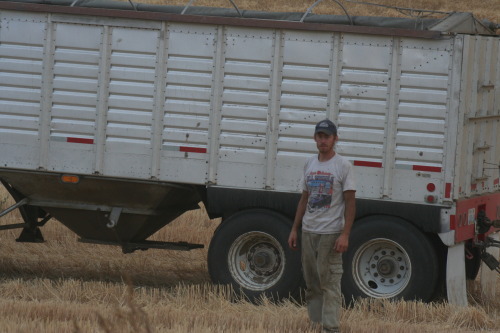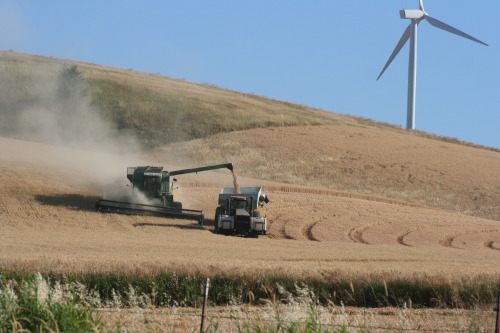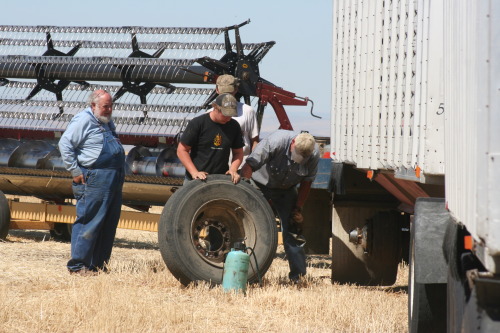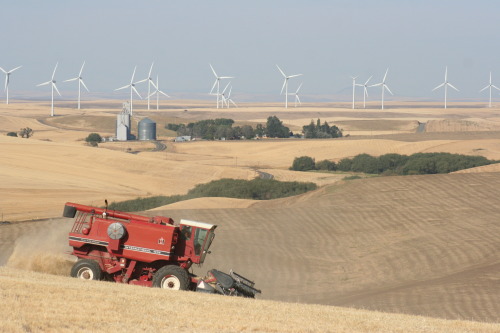Today I want to take a short break from China to introduce you to the HFC—the Hutchens Family Circus. As some of you know I grew up on a farm near Dayton, in eastern Washington State. My father and my brother still farm there, and there are certainly times when I miss being there. Wheat harvest, happening right now, is one of those times.
We endearingly call ourselves the HFC because over the years we have been through many crazy undertakings and mishaps. Nothing illegal, mind you, but sometimes stuff happens. I have a long list of stories tucked away that will make a good book when I take the time to write them up. One of the latest HFC “performances” was so compelling that I had to write about it. It might be the best show that the HFC has ever put on. Unfortunately, I missed the whole thing. Maybe by writing up the story and sharing it with you, I can participate by extension.
To give you a little background, my family has farmed for many generations. If you looked at the family history, you would see that every generation of my ancestors on my father’s side has had at least one farmer, so you could say that we have a long-term relationship with the vocation. I studied agronomy at WSU, planning to be a farmer, but after graduating I figured out that I had some other things to do first (like learn Chinese).
 Driving truck
Driving truck
Summertime is harvest time, and it usually begins with dry peas sometime around the middle of July. We usually cut the last of the wheat in late August or early September, depending on the weather. During harvest there is one objective: to finish. My best friend Ryan told me that you always look forward to the first day of harvest and the last day of harvest, and he’s right. To get there, you work long hours, usually 6am-8pm Monday through Saturday (Some of the neighbors work seven days a week, but we generally take Sundays off. When my dad was younger, he got some sage advice from an older farmer: “If you can’t get the crop in six days, you’re not going to get it in seven”). Fine advice in my opinion. That day of rest helps keep you sharp the rest of the week and gives you something to look forward to.
Harvest is hard work, but it is the best time of the year because everyone works the most as a team. Equipment has gotten bigger over the years and crews have gotten smaller, but you still have combine drivers, wagon drivers and truck drivers all working together to be as efficient as possible. Everyone knows how important this part of the year is, and everyone has the same objective: finish.
 TeamworkHarvest has a big impact on the community of Dayton. The town fills up with wheat trucks rambling slowly up Main Street towards the grain elevators. There are caravans of farm equipment that putter down the highway, creating long lines of frustrated drivers stuck behind them. Early in the mornings you see large pickups at the gas pumps or at the convenience stores, where farmers are filling the large diesel tanks in the back of their pickups and picking up a quick breakfast. At night, between 8-9pm, you see the same pickups at the grocery store or at the restaurants, where crewmembers grab a quick bite because they’re too tired to cook anything. They just want to go home, take a quick shower and head for bed. The five o’clock alarm comes very quickly.
TeamworkHarvest has a big impact on the community of Dayton. The town fills up with wheat trucks rambling slowly up Main Street towards the grain elevators. There are caravans of farm equipment that putter down the highway, creating long lines of frustrated drivers stuck behind them. Early in the mornings you see large pickups at the gas pumps or at the convenience stores, where farmers are filling the large diesel tanks in the back of their pickups and picking up a quick breakfast. At night, between 8-9pm, you see the same pickups at the grocery store or at the restaurants, where crewmembers grab a quick bite because they’re too tired to cook anything. They just want to go home, take a quick shower and head for bed. The five o’clock alarm comes very quickly.
Working harvest is like being a member of an exclusive club—either you are in, or you are not. People you run into ask if you’re working harvest, and it is a badge of honor to be able to say yes. They understand that you’re going to sacrifice your August for a cause greater than yourself. If you have ever worked harvest, you understand what I mean. If you haven’t, well, that’s why it’s an exclusive club.
Harvest is a time when many “war stories” happen—there’s the time when you lost an engine on a steep hillside, or your neighbor’s trailer rolled over in the ditch because the last set of wheels couldn’t quite make the corner. Some of the stories can be tragic—someone will get their hand caught in a belt and will lose a couple of fingers or worse. Other times the stories will be comical or heart-warming, like when a farmer is sick and can’t work, so the neighbors come with their own equipment to help him finish his harvest. Some of the stories are just plain strange, but all of them create a common bond among farmers. Everyone has stories, and when farmers get together, they tell them with enthusiasm, each person trying to top the last teller’s tales (“You lost a transmission today? That’s too bad. I lost a transmission and a final drive—on a hillside”).
 Repairs
Repairs
At the gas pumps, in the elevators or at the bars on Saturday night, during harvest you hear the same three questions over and over: 1) How is harvest going? 2) How are the yields? and 3) When do you think you’ll be done? These three questions are on everybody’s mind. Ask a farmer the first question, and you’re bound to get a long-winded description of the week’s breakdowns, plus a short description of where you’re crew is cutting this week. Ask a farmer the second question, and you are likely to receive a vague answer, as it’s considered a somewhat impolite to brag about your yields if they’re good (though the information still seems to get around somehow anyway), and no one wants to talk about poor yields. Towards the end of harvest, when you ask the third question, crew members’ faces light up when they say “hopefully”, since everyone is weary by the end and only wants to get done. You never get a definite answer, though, because there are many things (fires, rain, breakdowns, etc.) that could go wrong.
That’s the thing about being a farmer. You learn to realize that so much is out of your control. Every year you plant in the fall or in the spring, and you have to wait months for your work to realize its benefits. Between the time you plant and the time you harvest, many things could go wrong. Rains might come to early, or too late, or they might not come at all. It could stay too cold for too long or it could get too hot too early. Winter crops could be killed by a cold snap that hits late in the spring. Farmers have to worry about rodents, insects and disease. They have to worry about market prices beyond their control. Farming requires a lot of risk, and they say that you never see farmers at the casinos in Las Vegas because after living through each season, who needs any more gambling?
Harvest is also the cause of a phenomenon known as the “harvest widow.” Similar to the “golf widow” (though much worse), a harvest widow is a woman who sees her husband so little during harvest that he might as well be resting peacefully in the cemetery. Wives do not like this time of the year, but they put up with it because they know that harvest is what pays the bills. They know that it’s a time when everyone has to make sacrifices. For new brides, harvest can be a shock—they knew they were marrying a farmer, but they had no idea what harvest would really be like. If they want to see their husbands awake, they have to go visit them in the fields, where they ride in the combine or in the truck to the elevator and back. Trips to other towns for parts become dates, especially if the couple stops to get a milkshake (to go, of course) on the way home. The harvest shock is especially hard for new brides from the city who have never been around harvest before. Young couples struggle for the first couple harvests, but if they can survive them, their marriage will come out stronger.
Do you remember the main goal of harvest? When the final day arrives, it is a time of relief, of joy and of end-of-harvest barbecues. But there is also just a hint of melancholy knowing that your crew will break up for the year. Along the way, through challenges and successes, the harvest crew comes together as a team and spends time getting to know one another. You share stories about families, fishing, kids and memories of harvests past while creating new memories that will be told for years to come. Harvest is a special time for everyone involved. . .
 Riding the hills
Riding the hills
I hope you now understand a little of what it’s like to go through harvest, and you might even understand why people who have done it for many years want to be a part of it. So let’s return to the HFC (did I mention we have a theme song?).
My grandfather, who is 92 years old, has lived at the nursing home in Dayton for the last three years, but he is still very interested in what is happening on the farm. We make it a point to keep him up to date and one of the things we do to keep him involved is to get him out to the field to ride the combine at least once or twice during harvest. Grandpa isn’t as stable on his feet as he used to be, so it is getting hard for him to climb up the ladder and into the cab. The last two years he has been able to climb up with help from my dad and brother, but this year it wasn’t going to be possible. Just too dangerous. Grandpa still walks a little, but on the uneven ground of the field he’s not quite steady, so he has a wheelchair to help him get around.
Combines, as expensive as they are, don’t come with an elevator—this is where the HFC comes in—so my dad and brother decided to provide one (Mom took the pictures). As you can see from the pictures, they built a platform out of a wooden pallet and attached it to the bucket of an old Ford wheel tractor. They wheeled Grandpa up on to the platform and then carefully lifted him up to the cab of the combine. It was a delicate operation, and I would only trust three people in the world to pull it off.
Getting ready
Three generations
Going up!
Made it. . .
An HFC original
Look at the fourth picture. Can you see the look on my grandfather’s face? That smile, which is my father’s smile and is also my brother’s smile, is the reason they did this. My friends call that the “Dale Hutchens” smile. It is always quick to come when you see him, and it reflects the happiness of a life lived well. My grandfather, who vividly remembers farming with horses and recalls with a smile the day his father got his first tractor (“At the end of the day you could just pull into the shed, turn the engine off and go eat supper. You didn’t have to feed the horses anymore.”), loves riding on the combine and being a part of harvest. We all do.
These pictures and this undertaking are vintage HFC—they include old equipment, recycled materials and a healthy dose of creativity and determination. There are HFC stories that are funny, stories that are infuriating (or were at the time) and there are some that just make you shake your head in a amazement. But for me, this one is probably the best one of all because it also shows the love of a family that cares deeply for one another. As I sit here in Beijing at three in the morning writing this story, for the just third time in my 33 years on this earth I am missing harvest. I am having a great time here, but I hate being away. There’s no way I’m going to miss harvest next year. Some things are just too important.